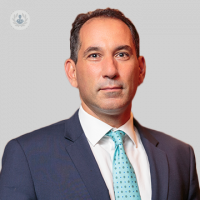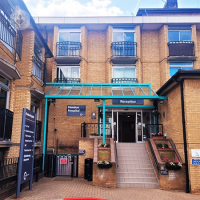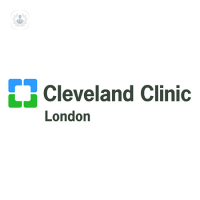What is inflammatory bowel disease (IBD)?
Inflammatory bowel disease (IBD) a medical term used to describe a group of diseases that cause chronic inflammation of the digestive tract.
Our digestive tract is responsible for breaking down food, absorbing nutrients and removing waste products from the body. If any part of the digestive tract gets inflamed, it can disrupt the normal flow of digestion and cause painful symptoms.

The main two types of IBD include:
Inflammatory bowel disease affects both men and women, most commonly between the ages of 20 and 40 years. However, in recent years its incidence has increased in children under 18 years of age.
Symptoms of inflammatory bowel disease
The symptoms vary depending on the severity of the disease and which part of the digestive tract is affected.
Crohn's disease
This can be quite aggressive in its symptoms, which are usually:
- abdominal pain and cramping
- fever
- bloated belly
- diarrhoea, with blood or pus
- fatigue
- reduced appetite
- weight loss
- mouth sores
- fistulas
- bleeding ulcers
- perianal involvement
Ulcerative Colitis
While it presents symptoms similar to Crohn's disease, they are more often milder. It is not that common for the belly to swell and fistulas and ulcers don't usually appear. Symptoms include:
- abdominal pain
- bloated belly
- diarrhoea, with blood or pus
- rectal pain and bleeding
- weight loss
- fatigue
- inability to defecate
Patients with ulcerative colitis will typically experience more intense rectal bleeding or blood loss through the anus.
Inflammatory bowel disease (IBD) is often confused with irritable bowel syndrome (IBS) which although causes similar symptoms, is very different. IBS is a disorder of the lower gastrointestinal (GI) tract, while IBD is inflammation or destruction of the intestines. It is possible to have both IBD and IBS.
Causes of inflammatory bowel disease
The cause of inflammatory bowel disease is unknown, although it is believed that genetics and problems with the immune system play a role. Approximately 20% of those affected by this disease have a direct family member who also suffers from it.
Prevention of inflammatory bowel disease
Since the cause of inflammatory bowel disease is not clear, there are no proven preventive measures to take. Early diagnosis is a good way to slow down symptoms and its progression.
Treatment of inflammatory bowel disease
Inflammatory bowel disease is chronic, so there currently isn’t a cure. Patients with inflammatory bowel disease should visit a gastroenterologist or specialist periodically to monitor the disease and receive appropriate treatment to control the symptoms.
07-28-2014 07-13-2023Inflammatory bowel disease (IBD)
Dr Devinder Bansi - Gastroenterology
Created on: 07-28-2014
Updated on: 07-13-2023
Edited by: Aoife Maguire
What is inflammatory bowel disease (IBD)?
Inflammatory bowel disease (IBD) a medical term used to describe a group of diseases that cause chronic inflammation of the digestive tract.
Our digestive tract is responsible for breaking down food, absorbing nutrients and removing waste products from the body. If any part of the digestive tract gets inflamed, it can disrupt the normal flow of digestion and cause painful symptoms.

The main two types of IBD include:
Inflammatory bowel disease affects both men and women, most commonly between the ages of 20 and 40 years. However, in recent years its incidence has increased in children under 18 years of age.
Symptoms of inflammatory bowel disease
The symptoms vary depending on the severity of the disease and which part of the digestive tract is affected.
Crohn's disease
This can be quite aggressive in its symptoms, which are usually:
- abdominal pain and cramping
- fever
- bloated belly
- diarrhoea, with blood or pus
- fatigue
- reduced appetite
- weight loss
- mouth sores
- fistulas
- bleeding ulcers
- perianal involvement
Ulcerative Colitis
While it presents symptoms similar to Crohn's disease, they are more often milder. It is not that common for the belly to swell and fistulas and ulcers don't usually appear. Symptoms include:
- abdominal pain
- bloated belly
- diarrhoea, with blood or pus
- rectal pain and bleeding
- weight loss
- fatigue
- inability to defecate
Patients with ulcerative colitis will typically experience more intense rectal bleeding or blood loss through the anus.
Inflammatory bowel disease (IBD) is often confused with irritable bowel syndrome (IBS) which although causes similar symptoms, is very different. IBS is a disorder of the lower gastrointestinal (GI) tract, while IBD is inflammation or destruction of the intestines. It is possible to have both IBD and IBS.
Causes of inflammatory bowel disease
The cause of inflammatory bowel disease is unknown, although it is believed that genetics and problems with the immune system play a role. Approximately 20% of those affected by this disease have a direct family member who also suffers from it.
Prevention of inflammatory bowel disease
Since the cause of inflammatory bowel disease is not clear, there are no proven preventive measures to take. Early diagnosis is a good way to slow down symptoms and its progression.
Treatment of inflammatory bowel disease
Inflammatory bowel disease is chronic, so there currently isn’t a cure. Patients with inflammatory bowel disease should visit a gastroenterologist or specialist periodically to monitor the disease and receive appropriate treatment to control the symptoms.
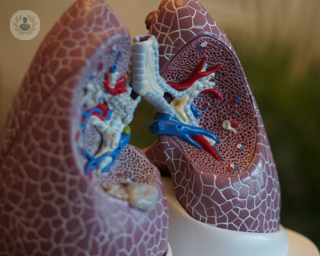

Understanding bronchiectasis
By Dr Dean Creer
2025-02-05
Bronchiectasis is a chronic respiratory condition characterised by abnormal widening and thickening of the airways (bronchi), which can result in recurrent or persistent chest infections and chronic inflammation of the airways. Leading respiratory medicine specialist Dr Dean Creer provides simple and informative answers to key questions about bronchiectasis for adults who may be affected by this condition. See more


Ulcerative colitis: Ask an expert – a Crohn’s and Colitis Awareness Week Special
By Dr Michael Mendall
2025-02-04
It's Crohn’s and Colitis Awareness Week and renowned London-based gastroenterologist, Dr Michael Mendall, is here to give us the facts about ulcerative colitis. See more


IBS symptoms: could they mean something else?
By Dr Lisa Das
2025-02-04
Symptoms aren't always what they seem. Leading consultant gastroenterologist Dr Lisa Das tells us about 4 other conditions to watch out for that share the same symptoms as irritable bowel syndrome. See more
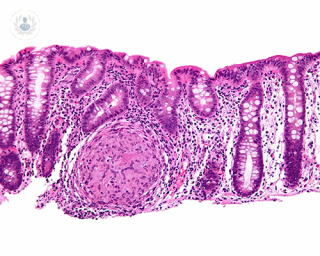

Inflammatory Bowel Disease (IBD): everything you need to know about Crohn’s disease and colitis
By Professor Stuart Bloom
2025-02-04
Inflammatory bowel disease affects thousands of people, but it can be confusing. What is the difference between IBD and IBS (irritable bowel syndrome)? What are Crohn's disease and ulcerative colitis? Top Doctors interviews expert Dr Stuart Bloom, who explains everything you need to know about IBD See more
Experts in Inflammatory bowel disease (IBD)
-
Dr Devinder Bansi
GastroenterologyExpert in:
- Colonoscopy
- Gastroscopy
- Indigestion (dyspepsia)
- Inflammatory bowel disease (IBD)
- Liver disease
- Abdominal pain
-
Dr John Martin
GastroenterologyExpert in:
- Colonoscopy
- Capsule endoscopy
- Inflammatory bowel disease (IBD)
- Polypectomy
- Irritable bowel syndrome (IBS)
- Bloated stomach
-
Professor Christos Toumpanakis
GastroenterologyExpert in:
- Neuroendocrine tumours
- Inflammatory bowel disease (IBD)
- Dysphagia
- Coeliac disease
- Acid reflux
- Chronic diarrhoea
-
Dr Aathavan Loganayagam
GastroenterologyExpert in:
- Bowel cancer
- Endoscopy
- Indigestion (dyspepsia)
- Inflammatory bowel disease (IBD)
- Irritable bowel syndrome (IBS)
- Colonoscopy
-
Dr Simon Gabe
GastroenterologyExpert in:
- Short bowel syndrome
- Malnutrition
- Colitis
- Inflammatory bowel disease (IBD)
- Intestinal failure
- Nutrition
- See all

Hendon Hospital - part of Circle Health Group
Hendon Hospital - part of Circle Health Group
46/50 Sunny Gardens Rd, London NW4 1RP
No existe teléfono en el centro.
By using the telephone number provided by TOP DOCTORS, you automatically agree to let us use your phone number for statistical and commercial purposes. For further information, read our Privacy Policy
Top Doctors

Cleveland Clinic Portland Place Outpatient Centre
Cleveland Clinic Portland Place Outpatient Centre
24 Portland Place, W1B 1LU
No existe teléfono en el centro.
By using the telephone number provided by TOP DOCTORS, you automatically agree to let us use your phone number for statistical and commercial purposes. For further information, read our Privacy Policy
Top Doctors

Goring Hall Hospital - part of Circle Health Group
Goring Hall Hospital - part of Circle Health Group
Bodiam Ave, Goring-by-Sea, Worthing BN12 5AT
No existe teléfono en el centro.
By using the telephone number provided by TOP DOCTORS, you automatically agree to let us use your phone number for statistical and commercial purposes. For further information, read our Privacy Policy
Top Doctors
-
Hendon Hospital - part of Circle Health Group
46/50 Sunny Gardens Rd, London NW4 1RP, North LondonExpert in:
- Cardiology
- General Surgery
- Gastroenterology
- Hand and wrist
- Nutrition and Dietetics
- Foot and ankle
-
Cleveland Clinic Portland Place Outpatient Centre
24 Portland Place, W1B 1LU, Central LondonExpert in:
- Diagnosis of Cancer
- Diagnostics
- Women’s health
- Sports Medicine
- General practice
- Health check up
-
Goring Hall Hospital - part of Circle Health Group
Bodiam Ave, Goring-by-Sea, Worthing BN12 5AT, Goring-by-SeaExpert in:
- Hip
- Cataracts
- Gallbladder surgery
- General Surgery
- Orthopaedic surgery
- Hernia
- See all
- Most viewed diseases, medical tests, and treatments
- Liver cancer
- Cardiovascular disease
- Respiratory infection
- Osteoporosis
- Immunotherapy
- Alzheimer's disease
- Child nutrition
- Migraine
- Paediatric rheumatology
- Autoimmune diseases


